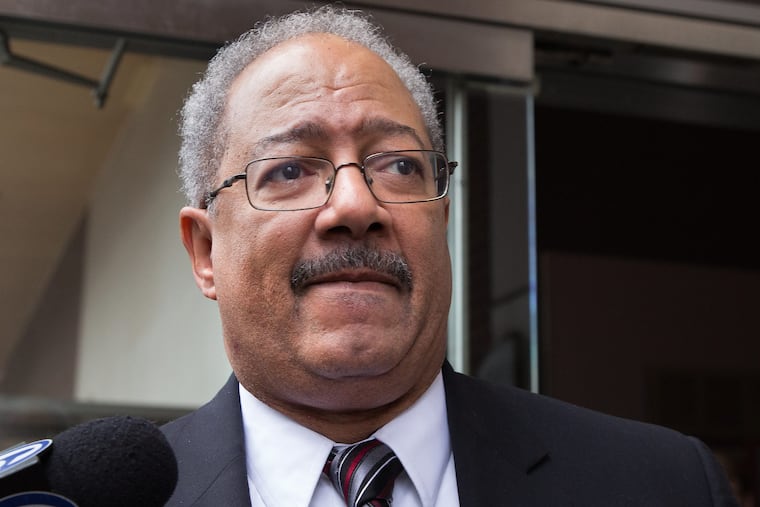Appeals court overturns U.S. Rep. Chaka Fattah’s bribery convictions, upholds guilty verdict on other counts
The decision offered a small measure of vindication for the former Democratic congressman but may not dramatically affect the decade-long sentence he received for other corruption-related crimes.

A federal appeals court in Philadelphia on Thursday overturned U.S. Rep. Chaka Fattah's bribery convictions in a decision that offered a small measure of vindication for the former Democratic congressman — but may not dramatically affect the decade-long sentence he received for other corruption-related crimes.
The ruling by a three-judge panel of the U.S. Court of Appeals for the Third Circuit held that jurors in Fattah's case had not been properly instructed on the legal definition of "political graft" – one narrowed by a U.S. Supreme Court opinion issued just days after they convicted the congressman in 2016.
Still, wrote Chief Judge D. Brooks Smith: "There is more than sufficient – and distinct – evidence to support Fattah's conviction on all of the other counts," including allegations that he stole federal grant funds, charitable donations, and campaign cash to pay off his personal and political debts.
It was not immediately clear whether prosecutors would seek to retry Fattah and Herbert Vederman, the congressman's wealthy benefactor, whose bribery convictions the Third Circuit also overturned Thursday. In a statement, U.S. Attorney William M. McSwain said he was pleased that the appellate court had affirmed most of his office's case.
As for the overturned bribery convictions, McSwain said: "The government will carefully study the matter and determine whether the interests of justice warrant a retrial … or whether it is sufficient to dismiss those counts in light of the fact that both Fattah and Vederman remain convicted of serious federal crimes."
Fattah's lawyers declined to comment on the situation Thursday. Vederman's lawyers did not respond to a request for comment.
>> RELATED: Read the Third Circuit's opinion
In its 142-page opinion, the Third Circuit panel relied heavily on McDonnell v. United States — a 2016 Supreme Court decision that vacated the conviction of former Virginia Gov. Robert F. McDonnell, raised the bar for prosecutors bringing political bribery cases, and, in the two years since, led to the toppling of a number of high-profile corruption cases.
The court held that federal bribery laws do not cover gifts exchanged for routine courtesies such as setting up meetings, hosting events, or making calls on behalf of constituents.
In Fattah's case, Vederman, a former Philadelphia deputy mayor, showered the congressman with benefits including cash payments to the congressman's children, college tuition for his South African au pair, and $18,000 to help with the purchase of a Poconos vacation home.
Fattah, in exchange, gave Vederman's girlfriend a job in his district office and lobbied other government officials — including then-President Barack Obama and Sen. Bob Casey (D., Pa.) — in hope of landing Vederman a job as an ambassador.
Smith, writing in the appeals court decision Thursday, concluded that even under the new McDonnell standards at least one of Fattah's actions – hiring Vederman's girlfriend – would clearly support a bribery conviction.
But because it was not clear whether the jurors reached their guilty verdict on that action alone or by also considering meetings and phone calls Fattah made to get Vederman a posting abroad, the convictions should be overturned and retried, the appellate panel — which also included Circuit Judges Joseph A. Greenaway Jr. and Cheryl Ann Krause — concluded.
"Faced with such uncertainty, we cannot assume the jury verdict was proper," Smith said. "Nor can we … determine whether Fattah's efforts to secure Vederman an ambassadorship crossed the line."
It was not immediately clear how the appeals court's decision might affect Fattah's 10-year prison sentence, one of the longest imposed on a member of Congress convicted of corruption-related federal crimes. Even if prosecutors decide not to retry the case, he still will have to be resentenced — although that proceeding may not change the length of his incarceration.
In crafting Fattah's punishment in 2016, U.S. District Judge Harvey Bartle III gave the congressman 17 decade-long sentences – each tied to a specific charge on which he had been convicted and all set to run at the same time rather than back to back.
Although the appellate court threw out four of those convictions Thursday, the remaining 13 — and their punishments — still stand.
Complicating matters further, the Third Circuit also reinstated convictions for both Fattah and Vederman on two counts that Bartle himself had previously tossed – both tied to the congressman's efforts to forge documents suggesting that his wife, former NBC10 anchor Renee Chenault-Fattah, had sold a 2012 Porsche convertible to Vederman in an attempt to cover up what prosecutors described as an $18,000 bribe.
Fattah, 61, was first elected in 1994 to represent a district that encompassed parts of Philadelphia and Montgomery County. In his 21 years in Congress, he held several high-level positions, including a seat on the powerful House Appropriations Committee.
He lost a primary reelection bid to his successor, then-State Rep. Dwight Evans, just before the trial began and resigned his seat under pressure from House colleagues shortly after his conviction.
Fattah remains housed in a federal detention center in McKean County, Pa., with a 2025 release date. Vederman, who had been sentenced to two years in prison, remains free while he appeals his case.
Both men have 14 days to decide whether they will seek to have their appeal reheard before a full panel of Third Circuit judges and could press their claims to the U.S. Supreme Court.
Also on Thursday, the Third Circuit affirmed the convictions of two additional Fattah codefendants — Karen Nicholas, the former executive director of the Fattah-founded Educational Advancement Alliance, and Robert J. Brand, a family friend and businessman. Both remain incarcerated.